Choosing a preschool is a big deal. You’re not just picking a place where your little one will spend a few hours—you’re choosing a second home, a learning hub, and the environment where their early development will flourish.
Whether you’re a first-time parent or you’ve done this before, knowing the right questions to ask when touring a preschool can make all the difference.
Let’s dive into the 10 must-ask questions, plus some bonus tips to help you feel totally confident in your decision.
Why Touring a Preschool Is So Important
Before we jump into the questions, let’s talk about why touring a preschool matters so much.
You can read all the brochures, scroll through websites like KidsZoneDr.com, and get glowing recommendations from friends. But nothing replaces actually stepping into the space and seeing it with your own eyes.
The vibe, the interaction between kids and staff, the classroom setup—it all paints a fuller picture than words ever could.
What to Look For During Your Visit
As you walk through the preschool, pay attention to:
- How engaged and happy the kids look
- Cleanliness and safety measures
- Teacher attentiveness
- Organization of spaces and routines
- Communication tools like parent boards or apps
And most importantly, trust your gut. If something feels “off,” it probably is.
1. What Is the Teacher-to-Child Ratio?
Why This Matters
The teacher-to-child ratio affects how much attention your child will get daily. Ask if it meets or exceeds your state’s licensing guidelines.
Small class sizes usually mean more one-on-one time, better supervision, and less stress for both kids and teachers.
Bonus Tip: If you’re unsure what’s considered a good ratio, this resource has a breakdown of quality preschool standards.
2. What Does a Typical Daily Schedule Look Like?
Routine Shapes Everything
Preschoolers thrive on routine. A structured daily schedule helps kids feel safe, know what to expect, and make transitions easier.
Make sure the program includes:
- Circle time
- Creative play
- Outdoor time
- Meals/snacks
- Nap or quiet time
You can also check KidsZoneDr’s daily routines and activities guide to compare what a great preschool day should look like.
3. What Qualifications and Training Do Teachers Have?
Credentials Equal Confidence
You wouldn’t want just anyone taking care of your child, right?
Ask about:
- Early childhood education degrees
- CPR and first aid certification
- Ongoing professional development
Preschool teachers should be more than babysitters—they’re facilitators of your child’s growth and learning.
Want more insight into this? Explore KidsZoneDr’s learning and development section.
4. How Is Discipline Handled?
Positive Guidance Over Punishment
Discipline policies can tell you a lot about the preschool’s culture.
Look for an approach that emphasizes:
- Redirection
- Clear expectations
- Positive reinforcement
Avoid places with harsh punishments or vague behavior policies. Positive guidance builds trust, not fear. You can also explore articles under the discipline and parenting tags.
5. What Safety Measures Are in Place?
From Doors to Drop-Off
Safety is non-negotiable.
Ask about:
- Secure entry systems
- Supervised drop-off/pick-up
- Emergency procedures
- Background checks for staff
Preschool should feel as safe as home. For more, read KidsZoneDr’s health and safety in preschool guide.

6. How Is Communication with Parents Managed?
Transparency Builds Trust
Communication is key in building a partnership between the preschool and your family.
Find out:
- Do they use an app or emails for updates?
- How often are progress reports shared?
- Can you contact teachers directly?
Good communication reflects openness and a true commitment to parental involvement. Visit the parental guidance and involvement page to learn more.
7. What Is the Approach to Learning and Development?
Structured Play, Real Growth
Look for a developmentally appropriate curriculum. That means activities that match your child’s stage of growth, both emotionally and cognitively.
Questions to ask:
- Is the curriculum play-based or academic?
- How is progress tracked?
- Are there opportunities for creativity and exploration?
Check KidsZoneDr’s preschool learning development page for examples of balanced programs.
8. What’s the Policy on Snacks, Meals, and Nutrition?
Healthy Kids, Happy Minds
Nutrition affects everything from mood to brain function.
Ask:
- Are meals provided or do kids bring lunch?
- Are allergies accommodated?
- Are they promoting healthy eating habits?
You can also dive into KidsZoneDr’s nutrition and healthy eating resources to see what good preschool eating looks like.
9. How Are Children Supported Emotionally and Socially?
Confidence Comes From Care
Preschool isn’t just ABCs and 123s—it’s where kids learn confidence, empathy, and resilience.
Ask about:
- Social-emotional learning (SEL) programs
- How staff handles tantrums or big emotions
- Conflict resolution methods
Explore KidsZoneDr’s articles on confidence, growth, and kids development.
10. What Happens If My Child Gets Sick or Has an Emergency?
Be Ready for the Unexpected
Life happens. Ask how the preschool handles:
- Illness policies
- Emergency contacts
- Administering medication
A detailed plan shows they’re prepared—and that means peace of mind for you.
Bonus Questions to Dig a Little Deeper
Questions You Didn’t Think to Ask (But Should)
- Can I drop in anytime to visit?
- How do you help new children transition?
- Are there opportunities for parental volunteering?
- What makes your preschool unique?
These extras help you separate a good preschool from a great one.
For more on helping your child adjust, visit:
➡️ First Day Tips
➡️ Classroom Structure
➡️ Daily Schedule Guides
Wrapping Up Your Preschool Tour
After your visit, jot down your thoughts:
- Did the staff seem warm and engaged?
- Was the space clean, safe, and inviting?
- Did your child seem comfortable?
Don’t forget to compare notes across multiple schools. You’re not just asking about preschool—you’re exploring a place that helps raise your child.
And trust us, that matters more than any fancy brochure.
Conclusion
Touring preschools doesn’t have to feel overwhelming. With the right questions in hand, you’ll walk away from every tour feeling more confident and informed.
Remember, you’re looking for a place that feels right—not just on paper, but in your heart. And when in doubt? Go back and reread the answers to these 10 questions. They’ll always point you in the right direction.
Want to explore more helpful resources? Check out the KidsZoneDr.com homepage and their full range of preschool support articles.
FAQs
1. How early should I start touring preschools?
Start 6–12 months in advance to get a feel for your options and secure a spot in your preferred program.
2. What’s a red flag during a preschool tour?
Unclear policies, unengaged staff, dirty facilities, or vague answers are major red flags.
3. Should I bring my child to the tour?
Yes! Watching how your child interacts with the space and staff can offer valuable insight.
4. What if my child has special needs?
Ask if the preschool offers support services or has experience accommodating different learning needs.
5. Can I switch schools later if things don’t work out?
Absolutely. It’s okay to make a change if it’s in your child’s best interest.
6. Do all preschools follow the same curriculum?
No. Some follow Montessori, Reggio Emilia, academic-focused, or play-based models. Ask for details.
7. Where can I find more expert tips and preschool guides?
Visit KidsZoneDr.com and explore the Preschool tag for expert advice, parent guides, and school-search tips.


